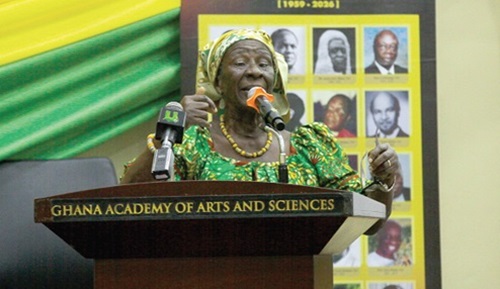A Professor of Anaesthesiology has urged the public to maximise the utilisation of music for its significant properties in various aspects of life, including child development, social gatherings, and even therapy.
Prof. Gladys Amponsah said music is an omnipresent gift from the natural sounds of nature to the rhythms of human life that helps to heal the soul of humanity.
“Music has been shown to have a positive impact on diseases such as dementia, hypertension, and stroke, and can be a valuable tool for people with learning disabilities,” she said in a thought-provoking lecture detailing how music shaped the development of babies through lullabies, the work rate of mankind among others at the Ephraim Amu Memorial Lecture 2025, in Accra last Thursday.
Present at the lecture was the President of the Ghana Academy of Arts and Sciences (GAAS), Prof. Emerita Isabella Akyinbah Quakyi, who also chaired the occasion; the Director of the Institute of Statistical, Social and Economic Research (ISSER) of the University of Ghana, Prof. Peter Quartey, students, among others.
Lecture
The lecture, titled "Music: Man's Lifelong Companion," explored the effects of music on individuals from conception to old age and all other endeavours of human life, including the relationship between music and work, health, academics, sports, and dignitaries, among others.
![]()
The audience at the event
The lecture was interspersed with various categories of music, demonstrating the diversity and richness of musical expression. It was also followed by a practical display of authentic dance from the audience, made up of students from various institutions.
Dignitaries, students and the general public present at the event were always on the edge to jump to their feet in response to the solemn and entertaining music that came alongside the presentation.
The lecture on music showed how music made from nature, such as water, animals, trees, bottles, tin, humans, among others, produced unique sounds that can shape lives in many ways, and harness their potential for good.
From lullabies such as Tuu Tuu Gborvi to Agbadza, Borborbor, Kpanlogo, jazz, rock and roll rhythms, and other types of music, the audience listened, watched and enthusiastically participated in the lecture.
Patrons were taken through the life of the late Dr Ephraim Amu, a Ghanaian music legend whom Prof. Amponsah described as “ethnomusicologist, composer, musician, teacher, good Christian, preacher” among others.
Patrons were offered a deeper understanding of music's impact on human life, from birth to old age and the therapeutic value and potential benefits for individuals with various disabilities.
She eulogised the memory of the late Dr Amu, praising his works which cut across national heroic music such as Yen ara asaase ni, Yaanom Abibrimma, Asem yi di ka, Bonwire Kente (Kro Hi Kro), among others.
Despite the potential risks, Prof. Amponsah emphasised that music is indeed a lifelong companion that could bring joy, comfort and enrichment to our lives.
“Music brings people together, improves health and well-being, and improves confidence and resilience.
It is a creative outlet and fun that brings joy and enriches our lives,” she said.
Students’ reflections
In an interview with the Daily Graphic, Mary Mensah, a student of Accra Girls’ High School, said, “The lecture was inspiring, showing how music affects us from birth to old age.
We never knew music had such a significant role in our lives".
She added that Dr Ephraim Amu's story highlighted the importance of embracing the country’s cultural heritage and being proud to learn about Ghanaian music and its history.
Sandra Appiah also said she was amazed by the benefits of music therapy for people with learning disabilities and diseases such as dementia.
“It was wonderful for me to discover that music can positively impact my studies and especially how it helps people with dementia; in general, I learnt music helps us remember a lot of things,” she said
Madam Celestine Agyei, a patron, said, "The lecture motivated us to explore our musical talents and appreciate the rich cultural diversity of Ghana.
We're excited to learn more about our country's music history".

